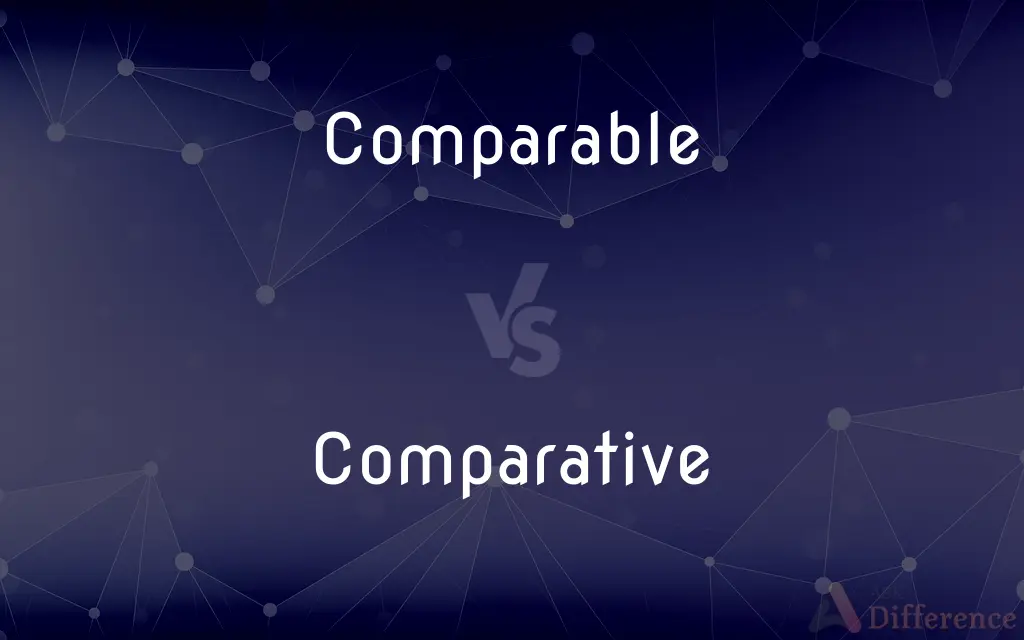Comparable vs. Comparative — What's the Difference?
By Tayyaba Rehman — Updated on October 26, 2023
"Comparable" refers to the ability to liken or equate things, while "comparative" involves the act of making comparisons.

Difference Between Comparable and Comparative
Table of Contents
ADVERTISEMENT
Key Differences
Comparable often denotes a similarity between things, suggesting that two or more entities can be equated or likened to each other in some respects. Comparative, on the other hand, is typically used to describe an analytical process or method that involves comparing different entities to discern their similarities and differences.
When using "comparable," the focus is usually on the shared attributes or qualities that make the subjects capable of comparison. In contrast, "comparative" emphasizes the act or methodology of comparing, often to highlight contrasts or make evaluations.
Comparable can imply a degree of similarity that makes two things almost equivalent in some aspects. Comparative usually refers to the comparative degree in grammar, or the systematic comparison in academic disciplines like comparative literature or comparative politics.
In everyday language, "comparable" is often used to suggest that two things are alike enough to be considered in relation to each other. "Comparative" often appears in more formal or academic contexts, indicating a structured or methodical comparison.
The essence of "comparable" lies in the potential for comparison based on shared traits. Conversely, "comparative" underscores the process of evaluating differences and similarities through systematic comparison.
ADVERTISEMENT
Comparison Chart
Definition
Capable of being compared due to similarities.
Involving or based on comparison.
Usage in Grammar
Not a grammatical term.
Refers to the comparative degree of adjectives.
Context
Often used in general conversation.
Commonly used in academic or formal contexts.
Implication
Similarity enough for comparison.
Process of comparing differences and similarities.
Example Disciplines
Used in general comparisons.
Used in fields like comparative literature or comparative politics.
Compare with Definitions
Comparable
Equivalent in quality
This wine is comparable to the one we had last night.
Comparative
Involving comparison
The comparative study of cultures is fascinating.
Comparable
Similar in nature or extent
The climates of the two regions are comparable.
Comparative
Relative, not absolute
His speed is impressive in a comparative sense.
Comparable
Suitable for comparison
Their skills are comparable, making the competition intense.
Comparative
Pertaining to the comparative degree in grammar
Bigger is the comparative form of big.
Comparable
Able to be likened
The two paintings are comparable in value.
Comparative
Based on relative assessments
Comparative data shows our progress over time.
Comparable
Admitting of comparison with another or others
“The satellite revolution is comparable to Gutenberg's invention of movable type” (Irvin Molotsky).
Comparative
In general linguistics, the comparative is a syntactic construction that serves to express a comparison between two (or more) entities or groups of entities in quality or degree - see also comparison (grammar) for an overview of comparison, as well as positive and superlative degrees of comparison. The syntax of comparative constructions is poorly understood due to the complexity of the data.
Comparable
Similar or equivalent
Pianists of comparable ability.
Comparative
Measured or judged by estimating the similarity or dissimilarity between one thing and another; relative
He returned to the comparative comfort of his own home
Comparable
(often with to) Able to be compared (to).
An elephant is comparable in size to a double-decker bus.
You can't say that robbing a bank is like pickpocketing. The two are just not comparable.
Comparative
Involving the systematic observation of the similarities or dissimilarities between two or more branches of science or subjects of study
Comparative religion
Comparable
(often with to) Similar (to); like.
Comparative
(of an adjective or adverb) expressing a higher degree of a quality, but not the highest possible (e.g. braver; more fiercely).
Comparable
(mathematics) Constituting a pair in a particular partial order.
Six and forty-two are comparable in the divides order, but six and nine are not.
Comparative
A comparative adjective or adverb.
Comparable
(grammar) Said of an adjective that has comparative and superlative forms.
"Big" is a comparable adjective, since it can take the forms "bigger" and "biggest"; but "unique" is not comparable, except in disputed, but common, usage.
Comparative
Relating to, based on, or involving comparison.
Comparable
Something suitable for comparison.
Comparative
Of or relating to the scientific or historical comparison of different phenomena, institutions, or objects, such as languages, legal systems, or anatomical structures, in an effort to understand their origins or relationships.
Comparable
Capable of being compared; worthy of comparison.
There is no blessing of life comparable to the enjoyment of a discreet and virtuous friend.
Comparative
Estimated by comparison; relative
A comparative newcomer.
Comparable
Able to be compared or worthy of comparison
Comparative
(Grammar) Of, relating to, or being the intermediate degree of comparison of adjectives, as better, sweeter, or more wonderful, or adverbs, as more softly.
Comparable
Conforming in every respect;
Boxes with corresponding dimensions
The like period of the preceding year
Comparative
The comparative degree.
Comparable
Matched in size or amount
The salaries of the two jobs are comparable.
Comparative
An adjective or adverb expressing the comparative degree.
Comparative
Of or relating to comparison.
Comparative
Using comparison as a method of study, or founded on something using it.
Comparative anatomy
Comparative
Approximated by comparison; relative.
Comparative
(obsolete) Comparable; bearing comparison.
Comparative
(grammar) A construction showing a relative quality, in English usually formed by adding more or appending -er. For example, the comparative of green is greener; of evil, more evil.
Comparative
(grammar) A word in the comparative form.
Comparative
Data used to make a comparison.
Comparative
(obsolete) An equal; a rival; a compeer.
Comparative
(obsolete) One who makes comparisons; one who affects wit.
Comparative
Of or pertaining to comparison.
Comparative
Proceeding from, or by the method of, comparison; as, the comparative sciences; the comparative anatomy.
Comparative
Estimated by comparison; relative; not positive or absolute, as compared with another thing or state.
The recurrence of comparative warmth and cold.
The bubble, by reason of its comparative levity to the fluid that incloses it, would necessarily ascend to the top.
Comparative
Expressing a degree greater or less than the positive degree of the quality denoted by an adjective or adverb. The comparative degree is formed from the positive by the use of -er, more, or less; as, brighter, more bright, or less bright.
Comparative
The comparative degree of adjectives and adverbs; also, the form by which the comparative degree is expressed; as, stronger, wiser, weaker, more stormy, less windy, are all comparatives.
In comparatives is expressed a relation of two; as in superlatives there is a relation of many.
Comparative
An equal; a rival; a compeer.
Gerard ever wasHis full comparative.
Comparative
One who makes comparisons; one who affects wit.
Comparative
The comparative form of an adjective;
`better' is the comparative of `good'
Comparative
Relating to or based on or involving comparison;
Comparative linguistics
Comparative
Having significance only in relation to something else;
A comparative newcomer
Comparative
Using comparisons to make a point
Her comparative analysis revealed key differences.
Common Curiosities
What does comparable mean?
Comparable means capable of being likened or equated due to similarities.
What does comparative mean?
Comparative involves or is based on comparison.
Are "comparable" and "comparative" synonyms?
Not exactly. While they both involve comparison, their usage and contexts differ.
Can "comparable" imply equality?
Yes, it can imply a degree of similarity or near equality in certain aspects.
Is "comparative" used in specific fields of study?
Yes, particularly in disciplines like comparative literature or comparative politics.
Can "comparable" be used for completely different things?
Generally, it’s used for things that have enough similarities to be compared.
Is "comparative" a grammatical term?
Yes, it refers to the comparative degree of adjectives in grammar.
How do I use "comparative" in a sentence?
"She conducted a comparative analysis of the two systems."
Are there disciplines dedicated to comparative studies?
Yes, such as comparative literature, comparative religion, etc.
Can I use "comparable" in formal writing?
Yes, "comparable" can be used in both formal and informal contexts.
How do I use "comparable" in a sentence?
"Her performance was comparable to that of a professional."
Does "comparable" have a degree in grammar?
No, it does not function as a grammatical degree like "comparative" does.
Can "comparative" imply contrast?
Yes, it often involves comparing differences as well as similarities.
Can "comparable" suggest almost equal value?
Yes, it can imply that two things are similar enough to be almost equivalent in some respects.
Is "comparative" only used in academic contexts?
Mostly, but it can also appear in general discussions involving comparisons.
Share Your Discovery

Previous Comparison
Absolute vs. Consummate
Next Comparison
Kennel vs. KernelAuthor Spotlight
Written by
Tayyaba RehmanTayyaba Rehman is a distinguished writer, currently serving as a primary contributor to askdifference.com. As a researcher in semantics and etymology, Tayyaba's passion for the complexity of languages and their distinctions has found a perfect home on the platform. Tayyaba delves into the intricacies of language, distinguishing between commonly confused words and phrases, thereby providing clarity for readers worldwide.















































